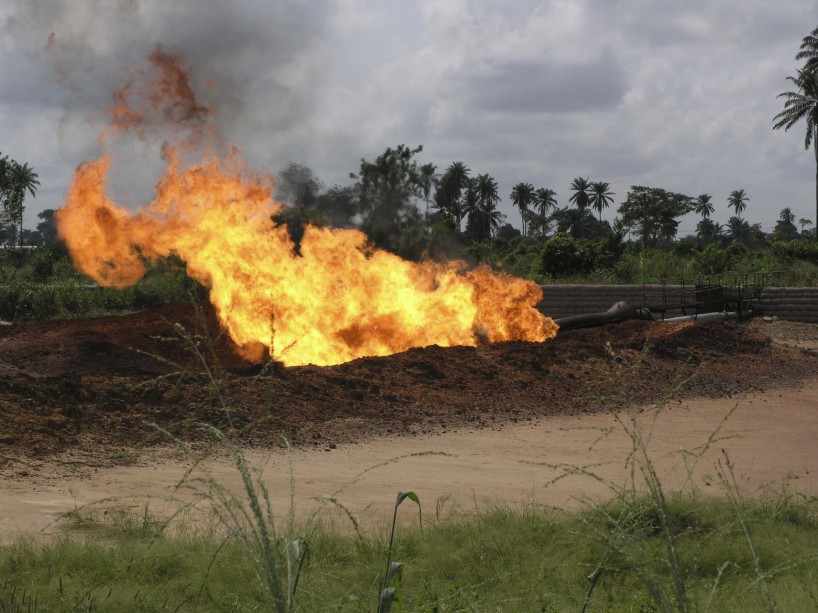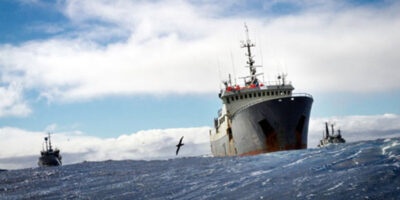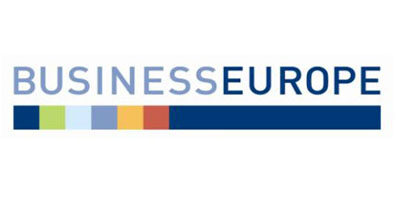
Shell gas flare at Rumuekpe in the Niger Delta, the main oil-producing region. Nigeria is the fifth largest exporter of oil to the United States, but most local people are still poor. 70 percent of them try to survive on less than a dollar a day. Photo: Elaine Gilligan/Friends of the Earth
An obscure US law from 1789 may have the potential to hold corporations, governments and individuals accountable for international human rights violations. The Alien Tort Statute grants US courts jurisdiction in cases of certain violations of international law, and cases can be brought by foreign citizens. The law reads: “The district courts shall have original jurisdiction of any civil action by an alien for a tort only, committed in violation of the law of nations or a treaty of the United States.”
Only one sentence long, it was created to prevent pirates and other international criminals from having a safe haven in America. For more than two hundred years this law was mostly dormant, until the court decision in Filartiga v. Pena-Irala in 1980. When the family members of a man tortured and killed by a Paraguayan official were successful in their suit, the ATS became the principal vehicle for litigating international human rights claims in U.S. courts. In that case, the court decided the ATS can apply to cases in which non-American “aliens” have suffered torture in foreign countries and want to legally pursue justice against their torturer in the American courts. Kiobel v. Royal Dutch Shell will decide if it also applies to actions that did not occur within the United States. If Shell loses, the ATS could have an impact on corporate accountability for its activities in countries known for rights abuse.
The Ogoni Nine
Esther Kiobel is the widow of Barinem Kiobel, one of the “Ogoni Nine” activists hanged by the Nigerian dictatorship in 1995. Last year, the US Supreme Court agreed to hear the case of Kiobel v. Royal Dutch Shell. She is the lead plaintiff. Kiobel, in a joint action with eleven others, has been in court since 2002, alleging that Royal Dutch Shell aided the government’s use of torture and murder, especially against protesters like Barinem Kiobel, writer Ken Saro-Wiwa and the seven others who formed the Movement for the Survival of the Ogoni People. Shell is accused of providing soldiers with transportation, food, compensation and staging areas for attacks. Shell maintains that it did not participate in any human rights abuse. “Shell denies any allegation that it engaged in any form of human rights violations in Nigeria,” said a company spokesperson. “We strongly condemn such human rights abuses which clearly violate both our company values and our high respect for the dignity of all people.”
Pirates and corporation
However, Shell’s guilt or innocence is not the central issue for the court. It has to decide whether the Alien Tort Statute, which has been used to take action against non-US citizens, also applies to the actions of a corporation outside the US. Shell argues that the ATS should not be used against aliens in U.S courts at all, except against pirates, as the law originally intended. For Kiobel and her counterparts, the Supreme Court decision will determine whether they can continue to pursue their case in the US, and there are broader implications for others who have no official legal system in their own countries. Peter Rees, Legal Director for Royal Dutch Shell, summed up the company’s position in a talk he gave, the only reference to the case on the company’s website: “Few cases could be more remote from the circumstances that prompted the First Congress to enact the Alien Tort Statute: namely, the prospect that international-law violations committed on U.S. soil might prompt international conflict and even war if left without a remedy in the nascent federal courts.” Katie Redford, a lawyer and a founder of Earth Rights International, a non-profit legal aid organization that offered legal advice to the plaintiffs, said that Shell’s arguments did not impress the judges. The previous ruling on extraterritoriality sets a precedent for future cases, and thus must be respected, she says. “Shell took an extreme position- not only from a human rights perspective and from a corporate immunity perspective, but also from the perspective of asking a court to overturn a precedent that they had already decided on just eight years ago.” Redford says the court also rejected the argument that the ATS be only used against piracy. “The court specifically stated in its opinion that the torturer was the modern day pirate and is the enemy of all mankind.”
Persons and corporations
Shell also argues that the ATS can only be used to hold nations and individuals violations of international law, which provides that nations and individuals – but not corporations – can be held liable for violation of the law like those alleged, even though corporations are legally considered “persons” under U.S law. (They were legally deemed persons following the Supreme Court ruling in the Citizens United v. Federal Election Campaign, which ruled on corporate fundraising to support political parties.) Redford says that this type of power without accountability is a dangerous mix, especially given the ubiquitous nature of corporations. “You’ve got to think of today’s world. You can’t be everywhere in terms of where you’re doing business, and nowhere in terms of where you can be regulated and held accountable.” The issue of corporate personhood, however, was not assessed in the Supreme Court hearings. It was not a part of the Court’s argument, and therefore could not be addressed, Redford said, arguing that it is up to the media to create a discourse on this topic. “There has been a big media focus, and there has been kind of a framing of this Kiobel case in the context of the Citizens United case,” she said. “How can corporations ask for free speech rights but then claim they have immunity and no responsibility for human rights abuses like torture, murder and war crimes?”
 Photo: Elaine Gilligan/Friends of the Earth” width=”625″ height=”468″> Shell oil spill at Rukpoku in 2004, showing no clean up or remediation after three months.
Photo: Elaine Gilligan/Friends of the Earth” width=”625″ height=”468″> Shell oil spill at Rukpoku in 2004, showing no clean up or remediation after three months.Photo: Elaine Gilligan/Friends of the Earth
The outcome
The Supreme Court ruling must be issued by the end of June, when the court session closes. Redford says the ruling could have many different outcomes, and that ultimately the decision will determine whether ATS cases against corporations are allowed to proceed in the US. The ATS was created to uphold international law standards in the US, Redford says. “It was an expression of this young nation’s desire to become part of the international community and make a commitment, not only for respecting international law but enforcing it.” “If you think of it in today’s context, we wouldn’t provide safety for torturers or people who commit genocide or war criminals. And if they are in our jurisdiction, these bad guys, then it is within our rights to haul them in to our courts. This case is just one example, but it’s an extreme example. The abuses at issue are people being tortured and executed, killed and raped and it doesn’t get much more extreme than that.”



